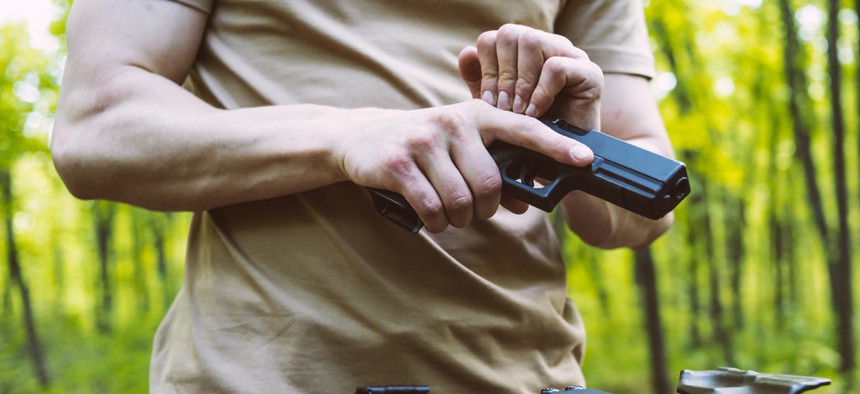Mayors Urge Senate to Approve Gun Background Check Bills

iStock.com/JohnAlexandr
Two House proposals would extend the checks to private transfers and the time dealers must wait before transferring a gun to a customer.
More than 150 mayors are backing two congressional bills that would strengthen firearms background check requirements—proposals President Biden urged Congress to adopt last week after he announced his administration’s first gun safety regulations.
The proposals, backed by a bipartisan group of mayors, would require background checks for all firearms purchases and require that checks done through the National Instant Criminal Background Check System (NICS) be completed before owners can take possession of new firearms.
“Americans are increasingly alarmed by mass shootings and by the steady increase in homicides and shootings plaguing too many neighborhoods,” the coalition of mayors wrote in a letter sent to U.S. senators and circulated by the U.S. Conference of Mayors. “It is time for our federal partners in Congress to take long overdue action to reduce gun violence and the terrible toll it takes on our cities and in our nation.”
The mayors urged the Senate to approve the House bills, writing that the action would save lives “by ensuring that individuals who are prohibited from owning firearms cannot circumvent the system.”
President Biden took his first steps to combat gun violence last week, announcing a limited series of measures that would fund local gun violence prevention programs, regulate “ghost guns” and pistol stabilizing braces, and provide model “red flag” legislation states could use to restrict firearms access to people in crisis.
The president acknowledged further action would be needed and called on Congress to pass additional firearms legislation, specifically pointing to the two bills backed by the group of mayors. The House approved the bills last month.
The Bipartisan Background Checks Act would expand background checks so that they would be required for firearm transfers between private parties.
The Enhanced Background Checks Act would close the so-called “Charleston loophole,” which has allowed federally licensed firearm dealers to transfer guns to customers before background checks are complete. Currently, dealers can transfer firearms to customers when background checks are not completed within three days. The loophole allowed white supremacist Dylann Roof to take possession of the gun he later used in a 2015 mass shooting at the Emanuel African Methodist Episcopal Church in Charleston, South Carolina that killed nine people.
The Enhanced Background Checks Act increases the amount of time a firearms dealer must wait, from three business days to a minimum of 10 business days, for a complete background.
The National Rifle Association has defended the three-day rule, saying it is necessary to ensure people are not arbitrarily denied their Second Amendment rights if federal officials are unable to complete background checks within a certain timeframe. The NRA has also pushed back against universal background checks, arguing that they would penalize legal gun owners.
More than 23 million active offense records that would prevent a person from purchasing a firearm are logged in the NICS system, and retailers have denied firearms purchases more than 1.9 million times as a result of background checks completed through the system, according to FBI data.
Upwards of 35,000 guns were transferred to people who would not have passed a NICS background check between 2008 and 2017 because of the three-day rule, according to Brady, a nonprofit organization that works to prevent gun violence.
The group of mayors urged the Senate to pass both pieces of legislation, writing that “an overwhelming majority of our constituents support these bills.”
Andrea Noble is a staff correspondent with Route Fifty.





